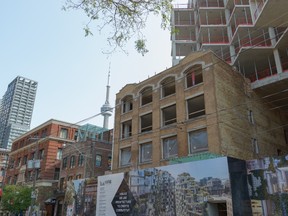Reviews and recommendations are unbiased and products are independently selected. Postmedia may earn an affiliate commission from purchases made through links on this page.
Article content
In recent weeks, there have been significant discussions about development charges (DCs) in municipalities across the GTA — but specifically in the City of Toronto. Government taxes, fees and charges, like DCs, have contributed to a “cost to build” crisis that has undermined the financial viability of new home construction, is stalling residential development and threatening future housing supply across the metropolitan area. As Toronto, higher orders of government, and the industry struggle to address this pressing challenge, it is clear that a fact-based discussion is needed to understand how the fees increased stratospherically and how they impact the cost of new housing. Nowis the time to address these spiraling costs.
Advertisement 2
Article content
Article content
Article content
New homes in Toronto are subject to a multitude of fees and charges collected by the municipality, such as DCs, community benefits charges, educational development charges, planning fees and parkland cash-in-lieu payments (among others). Of these, DCs are the largest of the municipal fees levied and, like all input, material, and labour costs, they impact the price paid by the new home buyer. Development charges were intended to offset the cost of infrastructure, transit and services incurred by growth, but given that enhanced infrastructure and services provide value for all and the eye-watering rate of increase, it is clear that both new and existing residents benefit from these investments.
The City of Toronto publishes its development charges rates on its website, meaning anyone can check the information at any time. The city even publishes historical rates, which allows going back to 2013 to verify rates of increase over the last decade. In 2013, development charges on a new single-family home were $19,412 (Nov. 1, 2013). This year (June 6, 2024), the rate reached $137,846 — an increase of 606 per cent. Over the same period, DCs on a one-bedroom apartment increased from $8,356 to $57,153 or 584 per cent.
Advertisement 3
Article content
To put that into perspective, over the past decade, the residential property tax rate has increased in the low double-digit percent range across the GTA. For the same time period, the sale price of the average home (all types) in Toronto has increased by approximately 95 per cent and according to the Bank of Canada, the actual rate of inflation was 31.54 per cent over that same period.
So development charges in the City of Toronto have increased six times faster than home prices and 20 times faster than inflation (hardly in line with inflation as some high profile commentators have alleged). This then begs the question: does it cost six times more today to pave a road or install a water main versus a decade ago — the answer is clearly no.
It is hardly surprising then that the City of Toronto’s DC reserve fund is swelling massively. Since 2013, the fund increased from $383 million to $2.821 billion as of December 31, 2023 — a 640 per cent increase. It must be pointed out that the city is charging roughly six times more per door and yet also seems to have six times more money in the reserve.
Advertisement 4
Article content
Let me be clear, municipal fees and charges are not the only factor driving home price appreciation, but they are a significant variable given the impact on new home prices, the cost to build challenge, the rate of increases and the accumulation of massive surpluses. Recently, the city has, laudably, recognized that DCs are a significant barrier to building new homes. This announcement, which is very narrowly focused, must be broadened to build much needed new housing and more importantly, it is time for a serious discussion about developing a new approach to fund infrastructure.
Dave Wilkes is President and CEO of the Building Industry and Land Development Association (BILD), the voice of the home building, land development and professional renovation industry in the GTA. For the latest industry news and new home data, visit www.bildgta.ca.
Article content











